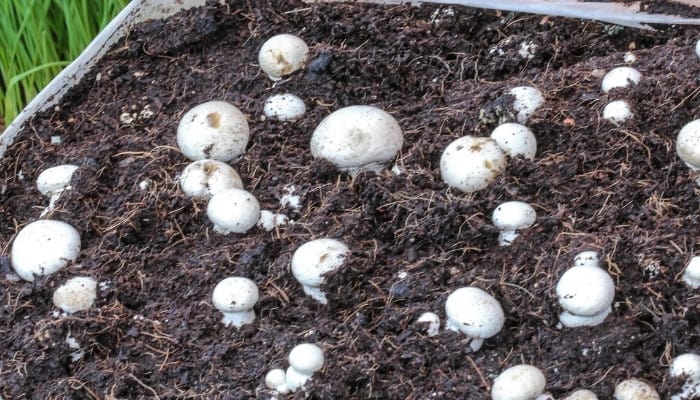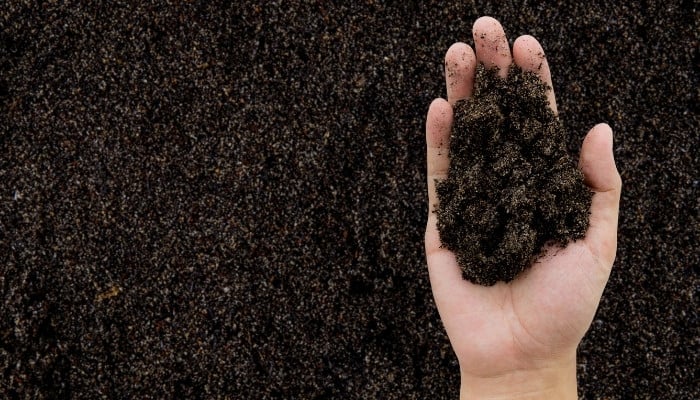Mushroom compost is an excellent organic fertilizer that is full of important nutrients for nourishing your soil and promoting healthy plant growth.
However, it isn’t quite the same as regular compost and should be used sparingly in certain situations.
What is mushroom compost good for? Mushroom compost provides nutrients to plants, changes soil’s pH level, improves water retention and soil quality, promotes germination, and is a good top-dressing for lawns. It is particularly good for amending clay soil, but due to its high salt content, it is not beneficial to all plants.
What exactly is mushroom compost? (Hint – it’s probably not what you think.) Why and when should you use it? How do you apply it? We’ll answer all that and more in the following.
Mushroom Compost Uses
Mushroom compost starts as the nutrient-dense substrate in which commercial mushroom growers use to grow mushrooms.
After the substrate is used for that purpose, it is still useful to gardeners on a much smaller scale.
Spent mushroom compost from commercial growers is sold to home gardeners to enrich and enhance their soil quality to help them grow healthy plants.
Mushroom compost is most commonly made of a blend of wheat straw, gypsum, and chicken manure.
Benefits of Mushroom Compost
Mushroom compost has a wide variety of benefits to both plants and the soil.
The material not only enriches the soil and provides plants with some nutrients but also increases the soil’s water retention, changes the soil’s pH levels, and promotes germination.
Mushroom compost contains nearly all the nutrients that plants require for healthy growth (in small amounts) and contains more water-soluble salts than most other compost and fertilizers.
Mushroom compost has a pH of between 6 and 7 on average. This means that the compost can act as a buffer to help lower a soil’s pH to make it more acidic without becoming too acidic.
You can find organic mushroom compost here on Amazon at a reasonable price.
Is Mushroom Compost Better Than Regular Compost?
Both mushroom compost and regular compost provide a ton of benefits to your soil and plants, but there are some key differences.
Mushroom compost is primarily used to increase the soil’s ability to hold moisture, but mushroom compost has a higher salt content than regular compost, which is detrimental for certain types of plants.
Mushroom compost takes less time to create than normal compost and is sometimes more readily available to purchase.
Regular compost is more versatile and rich in nutrients and micro-organisms, whereas mushroom compost is too acidic and contains too much salt for some plants.
All in all, in some cases, particularly when you desire to improve soil structure, mushroom compost is a good option, though this is of course dependent on your goals and on the type of plants with which you are working.
Can Mushroom Compost Burn Plants?
Because of its high salt content and slightly acidic pH, mushroom compost can “burn” plants if used incorrectly.
To avoid burning your plants, only use a little bit of the compost at a time, and avoid applying it too frequently.
Is Mushroom Compost Good for Vegetable Gardens?
Mushroom compost is excellent for a variety of plants, including most garden vegetables. It provides vegetables with a light application of the nutrients they need to thrive and produce a bountiful harvest.
It also helps the soil retain water, which is especially great for nutrient absorption.
That also means that the garden won’t need to be watered as frequently, so mushroom compost even benefits the gardener as well as the plants.
Is Mushroom Compost Good for Your Lawn?
If you have an established lawn, it can benefit from mushroom compost.
Not only will mushroom compost provide your grass with nutrients to keep it looking vibrant and healthy, but it can also act as a pre-emergent herbicide.
Because of its high salt content and slightly acidic pH, mushroom compost can kill seeds that have yet to sprout.
This is great for established lawns because it kills off the competition before it has the chance to grow.
Plants That Benefit From Mushroom Compost
Mushroom compost is an organic way to improve your soil’s structure and function and is a ideal when only a light fertilizer is desired. It benefits a wide range of plants, including:
- Flowers
- Trees
- Fruit trees
- Shrubs
- Herbs
- Vegetables
- Established lawns
When To Not Use Mushroom Compost
Despite its versatility and high nutrient content, mushroom compost contains high levels of water-soluble salts. While these salts help distribute nutrients to some plants, they can be detrimental to others.
It’s best to avoid applying mushroom compost to salt-sensitive plants, including:
- Azaleas
- Camellias
- Blueberry bushes
- Rhododendrons
- Hydrangeas
- Gardenias
Fresh mushroom compost can be a little strong for most gardens too. For best results, let the compost sit for a couple of years before using it, or apply it sparingly to your garden in the fall.
How To Use Mushroom Compost

Now that we’ve covered the basics of what mushroom compost is, you may be wondering how you can apply it to your garden.
Below is a guide on how to add mushroom compost to your lawn and garden.
When To Add Mushroom Compost
Mushroom compost does its best work when it sits in the soil for a while before planting season.
To accomplish this, you should mix mushroom compost thoroughly into the soil in autumn and let it sit over the winter.
This way, the nutrients have time to seep into the soil so that they can provide as much benefit to your plants as possible.
How To Apply Mushroom Compost
You can apply mushroom compost to your garden in a few ways. The most effective and most popular way is to mix the compost into your soil in the fall, right after your harvest season.
That way, the compost has time to allow its nutrients to properly seep into the soil before planting season comes in the spring.
Another way to add mushroom compost to your garden is to mix it with small amounts of soil and apply the mixture around established plants.
Related Questions:
Let’s answer some frequently asked questions about this unique type of compost.
Do Worms Like Mushroom Compost?
Worms tend to favor regular compost over mushroom compost.
While mushroom compost will not harm worms, there aren’t many nutrients available for the worms to enjoy due to the mushrooms using up many nutrients and the sterilization process most mushroom composts undergo.
Can You Grow Potatoes in Mushroom Compost?
When properly applied to the soil, mushroom compost is a fantastic light fertilizer for vegetables, including potatoes.
Though mushroom compost can help increase your potato harvest yield, it isn’t recommended to grow potatoes in pure mushroom compost as the nutrient levels are too low.
Conclusion
Mushroom compost is a versatile and all-natural way to lightly fertilize your garden and amend garden beds.
Not only does it benefit your plants, but it also benefits your soil for years to come and helps to reduce time spent watering.
This equates to less work for you in the long run – and that’s always a good thing!

